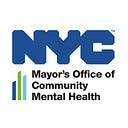New Yorkers in Behavioral Health — Camille: Regional Youth Advocacy Specialist II with New York State government
There are many job opportunities in behavioral health and human services. Read about more New Yorkers in Behavioral Health and submit a story of your own.
Tell us about your career path. How did you start out and what steps did you take to grow and advance in your profession?
In high school, I often struggled with focusing and didn’t enjoy the experience, even though I liked school when I was there. One day, while walking downtown in Brooklyn instead of attending classes, I encountered a man who, once we began talking, suggested an internship opportunity for me. I began interning as a youth peer advocate at one of the NYC Children’s Centers, where children and teens received behavioral health care. Although I was navigating my own lived experiences and felt nervous, I decided to give it a try. I connected with the youth, meeting them where they were emotionally, and this experience profoundly impacted me.
Later, I transitioned to working in residential facilities. After several years, I returned to youth peer advocacy at family resource centers, a move that drastically changed my life. The creation of the Youth Peer Advocate Credential was a significant milestone, and I was among the first to become credentialed. My passion shifted from direct work to supporting and creating opportunities for others in the field.
Eventually, I was recruited by a large non-profit that also worked with children and families, after making a networking connection during a Youth Peer Advocate Meeting. I began working at one of their centers which focused on training resources and community engagement and was later promoted to a Senior Advisor position. In this role, I co-supervised and supported leadership within the agency. Wanting to influence policies affecting youth and families, I further advanced my career and now serve as a Regional Youth Advocacy Specialist.
Were there any obstacles, unexpected circumstances, or hardships you had to navigate while pursuing your education and career goals? How did you handle these challenges?
There were many obstacles I faced as a person with the title of “Youth Peer Advocate,” especially in non-profit organizations. I possessed leadership skills that were often deemed problematic by many agencies I worked at, treating my passion for the work and my dedication to expanding and helping my workforce as if they were wrong. Youth Peer Advocates are often seen as children, but they are actually real leaders due to the level of leadership they are constantly exposed to in different spaces. They frequently grasp and acquire people skills that can be intimidating to those who have spent multiple years in school learning these skills. This often leaves youth peer advocates stuck and stagnant in their roles when they truly deserve to be in more executive-level positions to help support others. It took years to be recognized and heard due to my age and the titles of my previous roles. Many times, I felt stuck in non-profits that deemed me an issue, but now I am more accepted for who I am.
Another challenge I faced was having a child with special needs, which required me to focus on my child. Despite this, I never gave up on pursuing my education, though it caused many issues at work. I often had the skills but no degree, leading to promotions without the corresponding titles, despite my high work performance. How I handled these challenges was to stop caring about what others think and not viewing things as barriers. I kept going. It’s easy to give up on yourself, but it’s harder to keep going, and I love a challenge.
What contributed to your success in creating a meaningful career?
What contributed to my success in creating a meaningful career was shifting my attitude from caring about what people had to say to focusing on my purpose and keeping my passion alive. My peers played a significant role in this transformation. The more I helped and guided them, the more I began to take my own advice and put myself out there. I realized that my purpose in my career is to serve, congratulate others, and be a support system for those who have never felt supported. It’s easy to be critical and follow the crowd, but it’s much harder to stand out, as doing so often makes you a target. However, embracing this challenge was crucial to my success.
Additionally, supportive people in my life made a significant difference. Mentors like the man who first offered me an internship, and the non-profit leader who noticed my potential and recruited me, were instrumental. Interacting with Dr. Nivea Jackson, who created the first New York City Youth Peer Advocate Coalition and offered me an opportunity to work on the Lived Expertise Framework, also greatly impacted my journey. She recognized my potential and saw me for who I truly am. Programs and resources like the Youth Peer Advocate Credential also contributed to my growth and recognition in the field, strengthening my successful advocacy to HR for my promotion. Finally, my personal characteristics, such as resilience, passion, and the willingness to keep going despite obstacles, were fundamental in shaping my meaningful career.
Are there any education, training, or career goals you are still pursuing?
Despite my initial dislike for school, my personal experiences, including raising a son with autism spectrum disorder, motivated me to pursue higher education. I started online courses, and, after over six years, I am about to receive my bachelor’s degree. By 2025, I will have also completed my Master’s degree in Industrial-Organizational Psychology.
